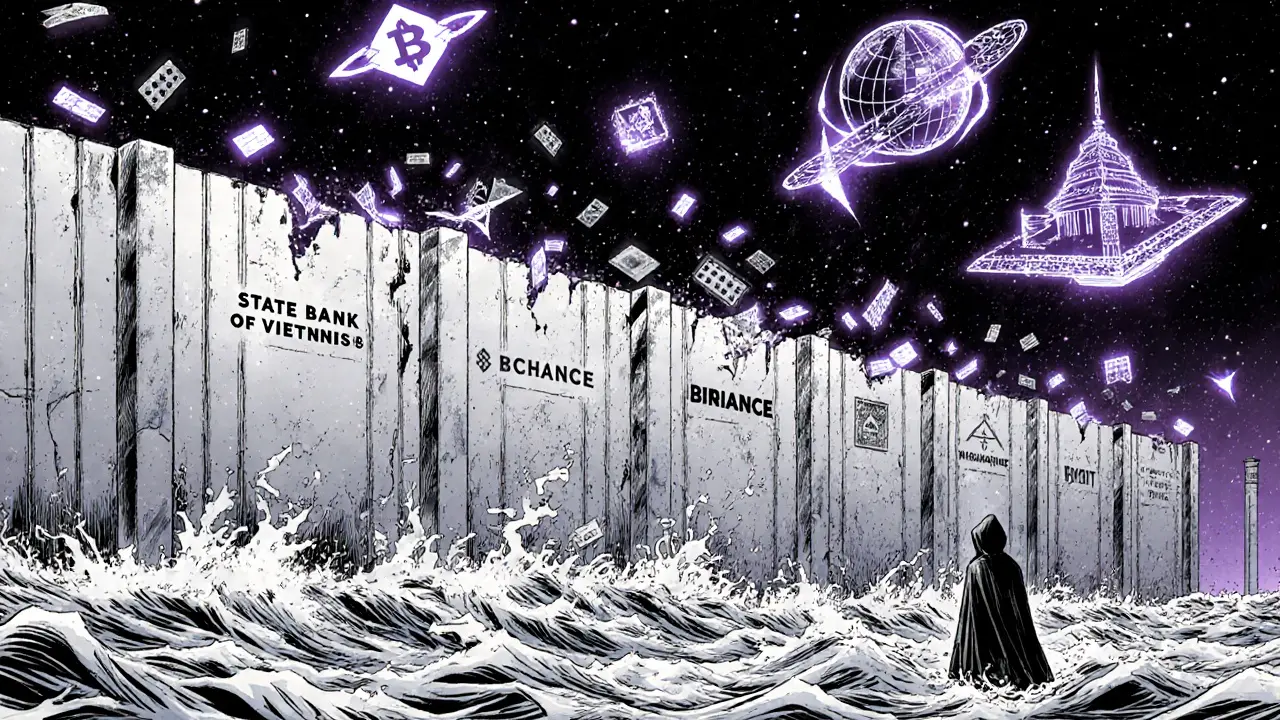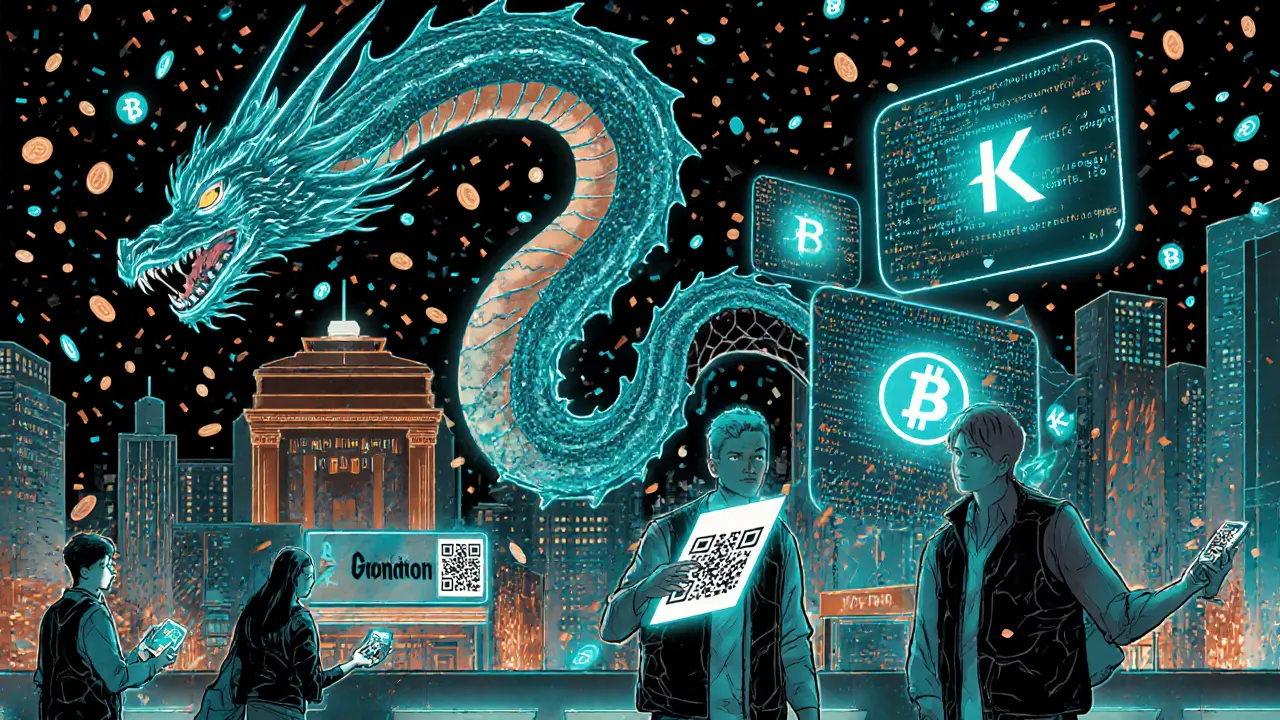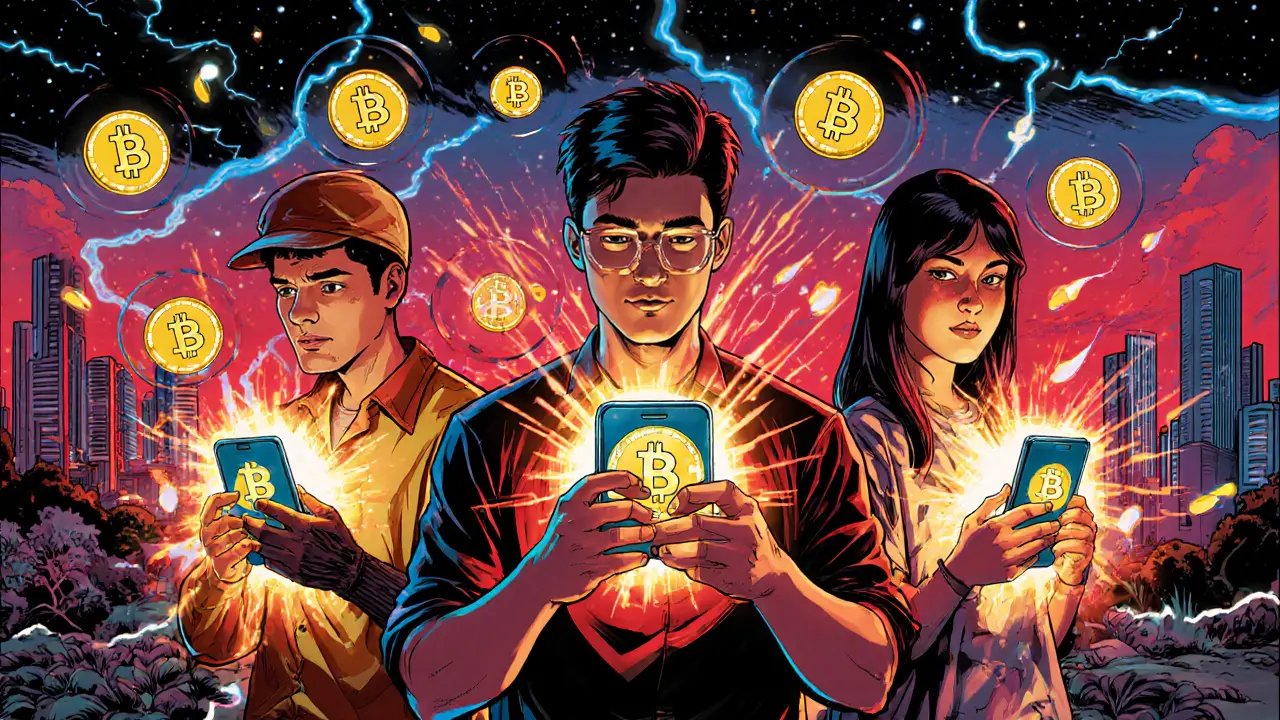Vietnam Crypto Remittance Calculator
The article states over $91 billion in crypto flows into Vietnam annually. Traditional remittance fees are typically 5-10%, while crypto transfers can cost as little as 0.1-0.5%. Calculate your potential savings.
Source Data: According to the article, Vietnam received over $100 billion in crypto value in 2024.
Calculation Notes: Assumes 0.25% crypto transfer fee and 5% traditional fee.
Every year, over $91 billion in cryptocurrency flows into Vietnam. That’s more than the annual GDP of many small countries. And yet, the government doesn’t allow crypto as legal tender. You can’t use Bitcoin to buy rice at the market. You can’t pay your electricity bill with Ethereum. But people still do it-millions of them. Why? Because restrictions don’t stop adoption; they just change how it happens.
Why Vietnam Is a Crypto Giant Despite the Ban
Vietnam doesn’t recognize cryptocurrency as money. The State Bank of Vietnam has made that clear for years. But that hasn’t slowed anything down. In fact, the country ranks third in the Asia-Pacific region for crypto adoption, behind only India and Pakistan. Chainalysis data shows Vietnam received over $100 billion in crypto value in 2024. That’s not just trading-it’s people sending, receiving, and holding digital assets at a scale unmatched in most of Southeast Asia. What’s driving this? It’s not speculation alone. While early adopters bought Bitcoin during the 2021 boom, today’s users are doing something more practical. They’re using crypto to send money home, to invest in global projects, and to earn income through play-to-earn games like Axie Infinity. The Ronin blockchain, built by Vietnamese company Sky Mavis, became the backbone for millions of players earning real money from gaming. That’s not fantasy-it’s a daily reality for over 2 million Vietnamese households. The country has 21.2 million adults who’ve used crypto. That’s one in every five adults. And it’s not just urban elites. Farmers in the Mekong Delta, factory workers in Ho Chi Minh City, students in Hanoi-they’re all using wallets, trading on local exchanges like VNDirect and Binance, and holding assets in decentralized storage. The barrier isn’t access. It’s legality.The $91 Billion Paradox: Legal Gray Area, Massive Activity
The $91 billion figure isn’t an estimate. It’s based on on-chain data from blockchain analytics firms tracking incoming transfers to Vietnamese wallets. These aren’t just speculative trades. A large portion comes from remittances, freelance payments, and income from global Web3 platforms. Vietnamese freelancers on Upwork or Fiverr get paid in USDT. Parents in the U.S. send crypto to relatives in Da Nang. Investors in Singapore buy tokens from Vietnamese founders. The government’s stance is simple: no crypto as currency. No exchanges licensed to trade crypto for Vietnamese dong. No banks can process crypto deposits. But here’s the catch-no one’s stopping people from using Binance, Bybit, or KuCoin. These platforms operate offshore. Users deposit fiat via peer-to-peer (P2P) channels, often through bank transfers labeled as “gifts” or “personal transfers.” The system works because it’s decentralized. There’s no single point to shut down. In 2024, daily crypto transaction volume in Vietnam exceeded $600 million. That’s more than the entire daily trading volume of some European nations. And it’s grown 55% in just one year-from July 2024 to June 2025. Experts call this the shift from “speculative boom” to “mature adoption.” People aren’t just buying and selling. They’re building.
How Restrictions Are Actually Driving Innovation
Vietnam’s crypto restrictions didn’t crush the market-they forced it to evolve. With no legal banking channels, the ecosystem had to become self-reliant. That’s why Vietnam now has one of the most advanced homegrown Web3 developer communities in Southeast Asia. Over 560,000 IT professionals live in Vietnam. Half of them are under 35. And a growing number are building blockchain tools used globally. Projects like TomoChain, Kyber Network, and Minter Network were started by Vietnamese teams. Local wallets like MathWallet and TokenPocket are used by millions outside Vietnam. DeFi protocols built in Hanoi serve users in the U.S., Nigeria, and Brazil. The government’s crackdown on exchanges didn’t stop innovation-it pushed it underground and into open-source. Developers created decentralized tools that don’t need local licenses. Smart contracts run on Ethereum, Solana, or Polygon. Users interact with them through mobile apps. No bank account needed. No ID verification beyond a phone number. This isn’t evasion. It’s adaptation. When you can’t use the official system, you build your own. Vietnam’s crypto scene is now a hybrid: part underground economy, part global tech hub. And it’s working.The September 2024 Pilot: A Crack in the Wall
In September 2024, the Vietnamese government quietly announced a five-year pilot program for crypto asset trading. It wasn’t legalization. But it was a shift. For the first time, the state acknowledged crypto’s presence-and began designing rules around it. The pilot allows certain licensed financial institutions to offer crypto-related services under strict supervision. Think of it like a sandbox: only approved players can enter. They must comply with KYC, anti-money laundering checks, and capital controls. But here’s the key: it’s the first official recognition that crypto isn’t going away. This move signals something important: the government knows it can’t ban what it can’t control. Instead, it’s trying to manage the flow. The goal? To capture tax revenue, prevent fraud, and keep capital from fleeing the country. But the system is still fragile. Most users still avoid licensed platforms because they’re slow, expensive, and require heavy documentation. The real action is still on P2P networks and offshore exchanges. The pilot might eventually bring some activity into the open. But for now, it’s more about control than inclusion.
Who’s Really Using Crypto in Vietnam?
Forget the stereotype of young traders flipping coins. The real users are diverse:- Freelancers who get paid in USDT from clients in the U.S. and Europe
- Parents sending money to children studying abroad-crypto is faster and cheaper than Western Union
- Game players earning Axie Infinity tokens that they cash out for rent or groceries
- Small business owners using crypto to buy equipment from Chinese suppliers without bank fees
- Investors holding Bitcoin as a hedge against inflation in the Vietnamese dong


Joy Whitenburg
November 13, 2025 AT 04:05Atheeth Akash
November 13, 2025 AT 20:21Phil Bradley
November 14, 2025 AT 19:48Stephanie Platis
November 16, 2025 AT 01:13Michelle Elizabeth
November 16, 2025 AT 14:38Kylie Stavinoha
November 17, 2025 AT 08:06Diana Dodu
November 17, 2025 AT 21:35Raymond Day
November 19, 2025 AT 12:59Noriko Yashiro
November 19, 2025 AT 20:52James Ragin
November 21, 2025 AT 13:17Michael Brooks
November 21, 2025 AT 21:50David Billesbach
November 23, 2025 AT 04:25Andy Purvis
November 24, 2025 AT 11:05Edward Phuakwatana
November 25, 2025 AT 05:44